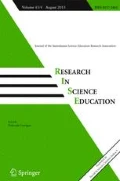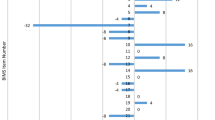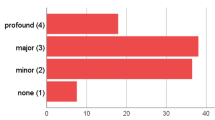Abstract
The purpose of this study was to investigate the various roles that early elementary teachers adopt when questioning, to scaffold dialogic interaction and students’ cognitive responses for argumentative practices over time. Teacher questioning is a pivotal contributing factor that shapes the role teachers play in promoting dialogic interaction in argumentative practice and that different roles serve different functions for promoting students’ conceptual understanding. The multiple-case study was designed as a follow-up study after a 4-year professional development program that emphasized an argument-based inquiry approach. Data sources included 30 lessons focusing on whole class discussion from three early elementary teachers’ classes. Data were analyzed through two approaches: (1) constant comparative method and (2) enumerative approach. This study conceptualized four critical roles of teacher questioning—dispenser, moderator, coach, and participant—in light of the ownership of ideas and activities. The findings revealed two salient changes in teachers’ use of questions and the relationships between teachers’ question-asking and students’ cognitive responses: (1) teachers increasingly used multiple roles in establishing argumentative discourse as they persistently implemented an argument-based inquiry approach, and (2) as teachers used multiple roles in establishing patterns of questioning and framing classroom interactions, higher levels of student cognitive responses were promoted. This study suggests that an essential component of teacher professional development should include the study of the various roles that teachers can play when questioning for establishing dialogic interaction in argumentation and that this development should consist of ongoing training with systematic support.



Similar content being viewed by others
References
Ahtee, M., Juuti, K., Lavonen, J., & Suomela, L. (2011). Questions asked by primary student teachers about observations of a science demonstration. European Journal of Teacher Education, 34(3), 347–361.
Bailey, K. M. (2006). Language teacher supervision: a case-based approach. New York: Cambridge University Press.
Bakhtin, M. M. (1981). The dialogic imagination. Austin: University of Texas Press (Michael Holquist, Ed. and Caryl Emerson and Michael Holquist, Trans).
Banilower, E. R., Smith, P. S., Weiss, I. R., Malzahn, K. A., Campbell, K. M., & Weis, A. M. (2013). Report of the 2012 National survey of science and mathematics education. Chapel Hill: Horizon Research.
Benus, M. J. (2011). The teacher's role in the establishment of whole-class dialogue in a fifth grade science classroom using argument-based inquiry. Iowa City: Unpublished doctoral dissertation.
Berland, L. K., & Reiser, B. J. (2011). Classroom communities’ adaptations of the practice of scientific argumentation. Science Education, 95(2), 191–216.
Bloom, B. S. (Ed.). (1956). Taxonomy of educational objectives. Handbook 1. Cognitive domain. New York: David McKay.
Cavagnetto, A. R. (2010). Argument to foster scientific literacy: a review of argument interventions in K–12 science contexts. Review of Educational Research, 80(3), 336–371.
Chen, Y.-C. (2011). Examining the integration of talk and writing for student knowledge construction through argumentation. (Unpublished doctoral dissertation). University of Iowa. Iowa City, IA.
Chen, Y.-C., Hand, B., & McDowell, L. (2013). The effects of writing-to-learn activities on elementary students’ conceptual understanding: Learning about force and motion through writing to older peers. Science Education, 97(5), 745–771.
Chen, Y.-C., & Steenhoek, J. (2014). Arguing like a scientist: Engaging students in core scientific practices. The American Biology Teacher, 76(4), 231–237.
Chin, C. (2006). Classroom interaction in science: teacher questioning and feedback to students’ responses. International Journal of Science Education, 28(11), 1315–1346.
Chin, C. (2007). Teacher questioning in science classrooms: approaches that stimulate productive thinking. Journal of Research in Science Teaching, 44(6), 815–843.
Chin, C., & Osborne, J. (2010). Students’ questions and discursive interaction: their impact on argumentation during collaborative group discussions in science. Journal of Research in Science Teaching, 47(7), 883–908.
Crawford, B. A. (2000). Embracing the essence of inquiry: new roles for science teachers. Journal of Research in Science Teaching, 37(9), 916–937.
Creswell, J. W. (2003). Research design: qualitative, quantitative, and mixed methods approaches. Thousand Oaks: Sage Publications.
Davis, E. A., Petish, D., & Smithey, J. (2006). Challenges new science teachers face. Review of Educational Research, 76(4), 607–651.
Davies, K. S. (2003). Change is hard: What science teachers are telling us about reform and teacher learning of innovative practices. Science Education, 87(1), 3–30.
Dori, Y. J., & Herscovitz, O. (2005). Case-based long-term professional development of science teachers. International Journal of Science Education, 27(12), 1413–1446.
Driver, R., Newton, P., & Osborne, J. (2000). Establishing the norms of scientific argumentation in classrooms. Science Education, 84(3), 287–312.
Duschl, R. (2008). Science education in three part harmony: balancing conceptual, epistemic, and social learning goals. Review of Research in Education, 32, 268–291.
Engin, M. (2012). Questioning to scaffold: an exploration of questions in pre-service teacher training feedback sessions. European Journal of Teacher Education, 36(1), 39–54.
Engle, R. A., & Conant, F. R. (2002). Guiding principles for fostering productive disciplinary engagement: explaining an emergent argument in a community of learners classroom. Cognition and Instruction, 20(4), 399–483.
Erdogan, I., & Campbell, T. (2008). Teacher questioning and interaction patterns in classrooms facilitated with differing levels of constructivist teaching practices. International Journal of Science Education, 30(14), 1891–1914.
Ford, M. J. (2008). Disciplinary authority and accountability in scientific practice and learning. Science Education, 92(3), 404–423.
Ford, M. J. (2012). A dialogic account of sense-making in scientific argumentation and reasoning. Cognition and Instruction, 30(3), 207–245.
Graesser, A. C., & Person, N. K. (1994). Question asking during tutoring. American Educational Research Journal, 31(1), 104–137.
Grigg, J., Kelly, K. A., Gamoran, A., & Borman, G. D. (2013). Effects of two scientific inquiry professional development interventions on teaching practice. Educational Evaluation and Policy Analysis, 35(1), 38–56.
Henderson, J. B., MacPherson, A., Osborne, J., & Wild, A. (2015). Beyond construction: Five arguments for the role and value of critique in learning science. International Journal of Science Education, 37(10), 1668–1697.
Jordan, M. E., & McDaniel Jr, R. R. (2014). Managing uncertainty during collaborative problem solving in elementary school teams: The role of peer influence in robotics engineering activity. Journal of the Learning Sciences, 23(4), 490–536.
Kapon, S., & diSessa, A. A. (2012). Reasoning through instructional analogies. Cognition and Instruction, 30(3), 261–310.
Kawalkar, A., & Vijapurkar, J. (2013). Scaffolding science talk: the role of teachers’ questions in the inquiry classroom. International Journal of Science Education, 35(12), 2004–2027.
Kelly, G. J., & Takao, A. (2002). Epistemic levels in argument: an analysis of university oceanography students’ use of evidence in writing. Science Education, 86, 314–342.
LeCompte, M. D., & Preissle, J. (Eds.). (1993). Ethnography and qualitative design in educational research (2nd ed.). San Diego: Academic Press.
Lee, Y. C., & Grace, M. (2012). Students' reasoning and decision making about a socioscientific issue: A cross-context comparison. Science Education, 96(5), 787–807.
Lee, Y., & Kinzie, M. (2012). Teacher question and student response with regard to cognition and language use. Instructional Science, 40(6), 857–874.
Lehrer, R., & Schauble, L. (2006). Scientific thinking and science literacy. In W. Damon, R. Lehrer, K. A. Renninger, & I. E. Sigel (Eds.), Handbook of child psychology (Child psychology in practice 6th ed., Vol. 4, pp. 153–196). Hoboken: Wiley.
Luft, J. A. (2001). Changing inquiry practices and beliefs: the impact of an inquiry-based professional development programme on beginning and experienced secondary science teachers. International Journal of Science Education, 23(5), 517–534.
Manz, E. (2015). Representing student argumentation as functionally emergent from scientific activity. Review of Educational Research. doi:10.3102/0034654314558490.
Martin, A. M., & Hand, B. (2009). Factors affecting the implementation of argument in the elementary science classroom: A longitudinal case study. Research in Science Education, 39(1), 17–38.
Marton, F., & Tsui, A. B. M. (2004). Classroom discourse and the space of learning. Mahwah: Lawrence Erlbaum Associates.
McNeill, K. L., & Pimentel, D. S. (2010). Scientific discourse in three urban classrooms: the role of the teacher in engaging high school students in argumentation. Science Education, 94(2), 203–229.
Mercer, N., & Littleton, K. (2007). Dialogue and the development of children’s thinking: a sociocultural approach. New York: Routledge.
Mercier, H., & Sperber, D. (2011). Why do humans reason? arguments for an argumentative theory. Behavioral and Brain Sciences, 34(2), 57–74.
Metz, K. E. (2011). Disentangling robust developmental constraints from the instructionally mutable: young children’s epistemic reasoning about a study of their own design. Journal of the Learning Sciences, 20(1), 50–110.
National Governors Association Center for Best Practices and Council of Chief State School Officers. (2010). Common core state standards. Washington, DC: National Governors Association Center for Best Practices, and Council of Chief State School Officers.
National Research Council. (1996). National science education standards. Washington, DC: National Academies Press.
National Research Council. (2012). A framework for K-12 science education: practices, crosscutting concepts, and core ideas. Washington, DC: National Academies Press.
Norton-Meier, L., Hand, B., Hockenberry, L., & Wise, K. (2008). Questions, claims, and evidence: The important place of argument in children's science writing. Portsmouth, NH: Heinemann.
Oliveira, A. W. (2010). Improving teacher questioning in science inquiry discussions through professional development. Journal for Research in Science Teaching, 447(4), 422–453.
Osborne, J., Simon, S., Christodoulou, A., Howell-Richardson, C., & Richardson, K. (2013). Learning to argue: a study of four schools and their attempt to develop the use of argumentation as a common instructional practice and its impact on students. Journal of Research in Science Teaching, 50(3), 315–347.
Palmer, D. H. (2009). Student interest generated during an inquiry skills lesson. Journal of Research in Science Teaching, 46(2), 147–165.
Park, S., & Chen, Y.-C. (2012). Mapping out the integration of the components of pedagogical content knowledge (PCK): Examples from high school biology classrooms. Journal of Research in Science Teaching, 49(7), 922–941.
Polman, J. L. (2004). Dialogic activity structures for project-based learning environments. Cognition and Instruction, 22(4), 431–466.
Roth, W.-M. (1996). Teacher questioning in an open-inquiry learning environment: interactions of context, content, and student responses. Journal of Research in Science Teaching, 33(7), 709–736.
Ruiz-Primo, M. A., & Furtak, E. M. (2007). Exploring teachers’ informal formative assessment practices and students’ understanding in the context of scientific inquiry. Journal of Research in Science Teaching, 44(1), 57–84.
Sampson, V., Grooms, J., & Walker, J. P. (2011). Argument-driven inquiry as a way to help students learn how to participate in scientific argumentation and craft written arguments: an exploratory study. Science Education, 95(2), 217–257.
Scott, P. H., Mortimer, E. F., & Aguiar, O. G. (2006). The tension between authoritative and dialogic discourse: a fundamental characteristic of meaning making interactions in high school science lessons. Science Education, 90(4), 605–631.
Sinclair, J. M., & Coulthard, M. (1975). Towards an analysis of discourse: the english used by teachers and pupils (pp. 19–59). London: Oxford University Press.
Strauss, A., & Corbin, J. (1990). Open coding. In A. Strauss & J. Corbin (Eds.), Basics of qualitative research: grounded theory procedures and techniques (2nd ed., pp. 101–121). Thousand Oaks: Sage.
Supovitz, J. A., & Turner, H. M. (2000). The effects of professional development on science teaching practices and classroom culture. Journal of Research in Science Teaching, 37(9), 963–980.
Tsai, C.-C., & Chang, C.-Y. (2005). Lasting effects of instruction guided by the conflict map: experimental study of learning about the causes of the seasons. Journal of Research in Science Education, 42(10), 1089–1111.
Tsai, P.-S., & Tsai, C.-C. (2014). College students’ skills of online argumentation: the role of scaffolding and their conceptions. The Internet and Higher Education, 21, 1–8.
Walsh, J. A., & Sattes, B. D. (2005). Quality questioning: research-based practice to engage every learner. London: Corwin Press.
Walshaw, M., & Anthony, G. (2008). The teacher’s role in classroom discourse: a review of recent research into mathematics classrooms. Review of Educational Research, 78(3), 516–551.
Walton, D. N. (1998). The new dialectic: conversational contexts of argument. Toronto: University of Toronto Press.
Wragg, E. C., & Brown, G. (2001). Questioning in the primary school. London: Routledge Falmer.
Yip, D. Y. (2004). Questioning skills for conceptual change in science instruction. Journal of Biological Education, 38(2), 76–83.
Zhai, J., & Tan, A.-L. (2015). Roles of teachers in orchestrating learning in elementary science classrooms. Research in Science Education, 1–20. doi: 10.1007/s11165-014-9451-9.
Acknowledgments
We wish to acknowledge Mohammad Ahmadibasir, Niphon Chanlen, Brian Pinney, and Ching-Mei Tseng for their intellectual contributions to this work and valuable time on the discussion of the theoretical framework and data analysis.
Author information
Authors and Affiliations
Corresponding author
Appendixes
Appendixes
Appendix A
Appendix B
Appendix C
Rights and permissions
About this article
Cite this article
Chen, YC., Hand, B. & Norton-Meier, L. Teacher Roles of Questioning in Early Elementary Science Classrooms: A Framework Promoting Student Cognitive Complexities in Argumentation. Res Sci Educ 47, 373–405 (2017). https://doi.org/10.1007/s11165-015-9506-6
Published:
Issue Date:
DOI: https://doi.org/10.1007/s11165-015-9506-6




